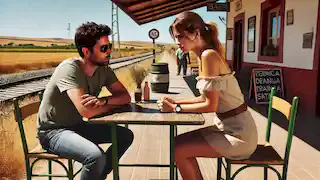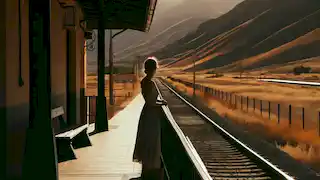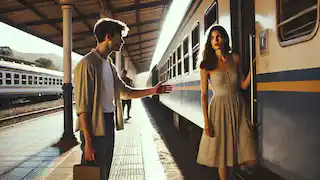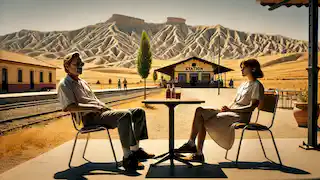The hills across the valley of Ebro were long and white. On this side, there was no shade, and the station sat amidst fields of grain and dry earth. The heat was unbearable. A curtain fluttered in the hot breeze, trying to block out the sun's harsh light, but it wasn't enough to cool the atmosphere. Two characters, an American man and a girl, sat at a table outside the station bar, quietly awaiting the arrival of the train that would take them to Madrid.
The girl, Jig, looked out at the distant hills and said, “They look like white elephants.”
The man smiled faintly. “I’ve never seen one,” he replied.
“You wouldn’t have,” the girl said with a little bite in her voice.
They ordered beers from the waitress who spoke no English, and the heat seemed to bear down harder on them as they sat in silence, sipping their drinks. The conversation started innocuously, but the tension between them was palpable, barely contained beneath the surface of their seemingly casual exchange.
The girl traced her finger around the rim of the glass. “It’s really an awfully simple operation, Jig,” the man said suddenly, trying to catch her eyes. “It’s not really an operation at all.”
She didn’t respond at first, keeping her eyes on the distant hills. “Then what will we do afterward?”
“We’ll be fine afterward. Just like we were before,” the man said, his tone reassuring, but there was an undercurrent of anxiety to it.
Jig glanced at him, her expression unreadable. “And you think that makes it better?” she asked, her voice cool.
The man shifted uncomfortably in his seat, adjusting his sunglasses as if shielding himself from the intensity of her gaze. “I think it’s the best thing for us to do. The best thing for you. I don’t want you to do anything you don’t want to do. But it’s really the simplest thing.”
The girl looked back at the hills. “And then what? We’ll be happy?”
“We’ll be happy,” the man said, with a tone of finality, as if to convince not only her but also himself.
But Jig wasn’t convinced. She turned toward the bar where the waitress brought them two more beers. The man continued to speak, trying to rationalize, trying to break through her silence. “I’ve known lots of people that have done it,” he said. “And afterward, they were all so happy.”
Jig’s eyes lingered on the beer in front of her, but her mind seemed far away. “Does it mean anything to you?” she asked, her voice quiet, almost as if the question were meant for herself.
“Of course, it does. But I don’t want anybody but you,” the man answered. His words came quickly, as if he were afraid that if he didn’t say them fast enough, they wouldn’t be believed.
Jig sighed, a long breath that seemed to carry the weight of something much bigger than the conversation they were having. “And if I do it, you’ll love me?” she asked, her tone still quiet, still distant.
“I love you now,” the man said, but there was hesitation in his voice, a slight falter.
“And afterward?”
“Afterward, I’ll love you just as much.”
The silence stretched between them, thick and heavy in the oppressive heat. Jig’s gaze wandered again to the hills, which now seemed to shimmer in the heat. They looked distant, unreachable, like something out of a dream. She sipped her beer slowly, contemplating, as if the answer she sought could be found in the frothy drink or in the distant horizon.
“You keep talking about afterward,” Jig said. “But what about now? What do we do now?”
The man leaned forward, reaching for her hand, but she pulled it away. “Now, we wait for the train. It’ll be here soon,” he said, though he wasn’t really talking about the train.
Jig stood up suddenly, pushing her chair back. “I don’t feel like waiting,” she said, walking toward the bar where the bartender was wiping down the counter.

The man watched her go, his hand still outstretched on the table. He let it fall slowly, like he had let something slip out of his grasp. He looked back at the hills, but they no longer seemed like white elephants to him. They were just hills, barren and empty, baking under the relentless sun.
Jig returned a moment later, her face calm, though her eyes held a storm. She sat back down but didn’t look at him. “Do you really think things will go back to the way they were?” she asked.
The man hesitated, then nodded. “Yes. I know they will. We’ll be happy, and it’ll be like this never happened.”
“But it did happen,” Jig said, her voice suddenly sharp. “And I don’t think you can just pretend like it didn’t.”
The man opened his mouth to speak, but no words came. He reached for his drink instead, taking a long gulp as if hoping the alcohol would drown the growing sense of unease inside him.
Jig stood again, but this time she walked toward the edge of the platform, where the tracks stretched out into the distance, disappearing into the shimmering haze of the horizon. The man watched her go, his heart pounding. He wanted to say something, to call her back, but he didn’t know what words would be enough.
She stood there for a long moment, looking out at the tracks, the hills, and the barren landscape. Finally, she turned around and walked back to the table, sitting down as if nothing had happened. The man looked at her, unsure, but Jig’s face was unreadable once again.
“You’ll do it, then?” the man asked after a long silence, his voice tentative.
Jig didn’t answer right away. She looked at the man, then back at the hills. “I don’t know,” she said softly. “I just don’t know.”
They sat in silence again, the weight of their unspoken thoughts pressing down on them as the heat bore down relentlessly.
The sound of the train in the distance broke the tension, faint but unmistakable. The man looked at Jig, his eyes filled with uncertainty. “It’s coming,” he said.
“I know,” Jig replied.
They gathered their things, neither speaking as they prepared to board the train. The man looked back one more time at the hills, but Jig didn’t. She kept her eyes ahead, focused on the path in front of her.
As the train pulled into the station, the man reached for Jig’s hand, but she didn’t take it. They stood there, side by side but worlds apart, waiting for the train that would carry them toward an uncertain future.
The end seemed as inevitable as the beginning, and yet nothing felt resolved. The hills stood in the distance, silent witnesses to a moment that would change everything, whether they acknowledged it or not.

The air between them was thick with unsaid words, with decisions unmade, with futures untold. The man wanted to believe that things would be simple, that they could just go back to the way things were before. But Jig knew better. She knew that some things, once set into motion, could never be undone.
The train whistle blew, loud and shrill, cutting through the stillness like a blade. The man looked at Jig again, searching her face for something, anything that would tell him what would happen next.
But Jig remained inscrutable, her gaze fixed on the distant horizon. The train slowed to a stop in front of them, its doors sliding open with a hiss. The man hesitated, waiting for her to move, to make a choice.
For a moment, Jig stood still, her eyes flickering back to the hills one last time before she turned to face the man. “I guess we should go,” she said, her voice flat, emotionless.
The man nodded, though he still wasn’t sure what any of it meant.
They stepped onto the train together, but even as they sat side by side in the compartment, a space seemed to open between them, a gulf that neither of them could cross.
The train began to move, slowly at first, then faster, leaving the station behind. The landscape blurred past the window, and the hills like white elephants faded from view.

They didn’t speak again for a long time. The rhythm of the train on the tracks filled the silence between them, and the world outside seemed distant and far away. The man wanted to reach out to her, to say something, but every time he opened his mouth, the words caught in his throat.
Jig stared out the window, her reflection ghostly against the darkening sky. She felt the weight of the decision pressing down on her, the weight of the life she carried within her. She didn’t know what the future held, but she knew it would never be the same as it was before.
They traveled in silence as the train sped through the Spanish countryside, past fields of grain, past barren hills, past villages that seemed to flicker in and out of existence like dreams. The sun dipped lower in the sky, casting long shadows across the land.
At last, the man turned to Jig, his voice hesitant. “Are you sure?”
Jig didn’t answer right away. She kept her eyes on the fading landscape outside the window, her thoughts far away. When she finally spoke, her voice was barely a whisper. “No,” she said. “I’m not sure.”
The man reached for her hand, but she pulled it away. They sat there, side by side but worlds apart, as the train carried them into the unknown.
{{{-04}}}
The journey stretched on, but the distance between them only seemed to grow wider. The man closed his eyes, leaning his head back against the seat, the rhythmic clatter of the train lulling him into a restless sleep.
Jig continued to stare out the window, her mind turning over the endless possibilities, the roads not taken, the choices still left to make. She knew that the decision would come, eventually, but for now, she was content to let the train carry her forward, wherever it might go.
The hills like white elephants were far behind them now, but their presence lingered, a distant echo of a time and a place where things were simpler, where choices hadn’t yet been made, and where the future still seemed like something they could control.
But life, like the train they were on, moved forward relentlessly, carrying them toward a destination they could not yet see.
As the night fell and the world outside the window faded into darkness, Jig closed her eyes and let herself drift, surrendering to the pull of the unknown.



















